Add Your Heading Text Here
by Mrs. Ethel Hilton pg 777 Big Hill Country 1977
Grandfather (James) Potts, with his son John (Jack) and daughter Isabella (Bella), came West from Ontario to the Morley district in 1884. They had brought cattle from the east for John Graham of Morleyville. Jack’s friend, Alec Jamieson, also accompanied them. Grandmother Potts and the other children, Lucy, Jessie and Walter (Watt), came out around 1886 or 1887 to join the others. William, the eldest son, lived in Montreal.
Jack Potts and Alec Jamieson, before either of them were married, joined the Klondike Gold Rush in the “Trail of 1898.” After that Jack made two trips to Alaska and the Yukon as a chainman with two Government surveyors. He finally settled down as foreman for a Calgary cattleman on the Red Deer River. He stayed there 15 years.
I still have Jack’s cooking vessel from the Klondike, interesting because of being made out of a whole sheet of copper, there being no possibility of a seam, for which there was no means of any repair.
In 1912 I sailed for Canada (on a ship called “The Canada”), a few days after the Titanic had sunk. We were almost a week going through the
ice field. It was very cold and many icebergs were visible north of us. Our destination was Quebec, but, finally, we were landed at Halifax, Nova Scotia.
I arrived in Calgary looking for a job, and in a few days went to the Potts brothers’ ranch in Jumping Pound to teach three children. I had trained as a teacher and spent five years in a boys’ school in South Wales. My reason for coming to Cochrane was the incentive to see my sister and brother. Anyone wanting to teach in a Government School, at that time, was required to go to Normal School. This I refused to do. My sister Alice (Howlett) had been appointed teacher at the new Glendale School and had been teaching there a year or so when I arrived. She married (Prigge), and was later given the Brushy Ridge School. My sister is now 85 and living in Victoria.
As I was a very poor sailor and was ill from my trip, Dr. Park, the local doctor, introduced me to C. W. Fisher, the Speaker in the Legislature, and I was given a permit for a year, the result was, a little later, being given a job at the Jumping Pound School.
The Potts brothers had their ranch in full swing with horses and some purebred cattle. Jack Potts’ brand was the Double Egg Bar (locally known as “The Dumb Bells”) on the right hip for cattle. Watt Potts’ brand was the Running or Flying W on the left shoulder for horses. When Watt drove me out to the ranch, I was very pleased to see a large lake. I couldn’t understand why they had no boat, so I advanced
my feelings. Frank Fletcher, a boat builder from Eastern Canada, was working for the Potts brothers and it was only a few days before a lovely boat arrived on that lake, and we all enjoyed it. The cattle and horses used to go into the water when the weather got very hot.
My pupils, for the six months I was at the Potts Ranch, were the children of Mr. and Mrs. Watt Potts, Johnnie, Jewel and Jimmie. Their youngest child, Gwen, was born while I was there. Mrs. Watt Potts’ brother was Charlie Mickle, who ran the livery barn in Cochrane. I used to visit the Mickles often and stay the night because I was giving their daughter, Nellie, piano lessons and their elder daughter, Elva, arithmetic. They also had a son Lennie, and a daughter Violet. Another girl Belle died while I was there.
After I became a teacher at the Jumping Pound School, I boarded at Bateman’s. Mrs. Bateman was Jack’s younger sister, Jessie, and John Bateman drove in and out of Calgary with the mail, weekly. They also had a Post Office for the Jumping Pound district, until John Bateman’s
cousin Geoff arrived from Cork in Ireland and took over the weekly drive. John Bateman also had land and stock and was one of the school directors. Another director was Mr. Copithorne, who had several children. He had also come from Ireland and had land and cattle. I bought a saddle horse while I was teaching, and went visiting, getting to know the neighbours. Some of my pupils were Margaret and Percy Copithorne and a younger sister; Dolly Bateman, 16; Jim Bateman about 14; and Bill Bateman. Dolly and her sister Lucy were drowned in the Jumping Pound.
On inquiring as to the source of the funny name, Jumping Pound, I was informed that it came from the Indians [sic], who were supposed to have “jumped over it,” others said it was thus named because fish were easily seen skipping about therein.
Mr. and Mrs. Frank Ricks had a ranch next to the Potts brothers, and Mrs. Ricks, (Belle), Mrs. Jessie Bateman (Jumping Pound), and Mrs. Lucy Jamieson (Morley) were all sisters of Jack’s. Mrs. Rick’s husband shot himself the year I arrived in Canada. Their son Walter carried on, but he became blind and moved to Calgary.
Jack Potts and I (Ethel Howlett) were married in August 1914, and our daughter Jean was born in 1916. When she was four she had
diphtheria. Jack had been in bed for a year with a stroke, from which he slowly improved, but we knew we would have to leave the ranch. It was then rented to Brewsters from Banff, who ran their horses there until it was sold to the Indian Department of the Federal Government. It is now part of the Stoney Indian Reserve.
When we were first married, the Potts brothers ranched together and Jack built our ranch house. Before that, Jack lived in a shack, but a log house had been built for Watt and his wife. Jack had his shack close to Watt’s house and had his meals with them. After my six months from school, I became engaged to Jack and he built our house.
In 1912 Potts’ close neighbours were Arthur and Stanley Cope. Arthur Cope drove me into Calgary and took me to the first Stampede. On the other side of Potts was the Merino Ranch. The owner sold it to an English lady, Countess Bubna. She was married to a Count. They had two daughters, who were also Countesses; the younger one was often at our place. She and I used to ride together. The next neighbour to them was Dr. Ritchie, who was retired, with one or two grownup children. We used to pass these two places every time we went to Cochrane. It was about ten miles I think. Dr. Ritchie had purchased the Butler homestead at the mouth of the Jumping Pound, and on this land, he grew the first wheat to be ripened in the Cochrane District. It was shipped from Cochrane in the fall of 1908 and was the first carload of wheat ever sent from a point west of Calgary.
My memory recalls “Happy Davis,” the local policeman for Cochrane and district. He was very much liked and talked about at the time that I arrived. He was shot walking down the village street with his dog. After his funeral, there were many discussions as to who was to look after his dog. Everyone wanted the job, he had been so popular and much liked.
Another man in Cochrane was Mr. Johnson, who ran the butcher shop.
Watt Potts, in town, to buy a sack of grain, discovered, as he carried a sack out to his wagon, that there was a hole in the sack and the grain was running out. So of course he pointed this out, and the serious answer he received from the owner was, “Well, we are not charging you for the hole.”
My husband’s older brother Bill’s wife died in Montreal in the early days, and Watt Potts was sent down to bring Bill’s three children up to the old home on the Ghost River to live with Grandfather Potts and his family. Their names were Bill, born in 1885; Walter (Watty), born in 1889, and Edith, born in 1887. Edith married Frank Wellman, who managed the shop for the Indians [sic] at Morley Station. The Wellmans had three children: Edith, 1914; Lorna, 1908 and William, 1918. Wellman died of flu, the winter of 1920 when it was so bad.
Young Walter (Watty) worked for Brewsters, who had a contract from the C.P.R., transporting American millionaires and guests from Banff station to the magnificent Banff Springs C.P.R. Hotel, 60 miles west of Cochrane.
Neighbours over near Grandad were Mr. and Mrs. Coleman. They had a few head of stock but were not in the ranching business. I think he was an official, perhaps a magistrate because he was legally able to marry Jack and me, but we had arranged to go to Calgary. Their daughter Frances was at school down East and was home for holidays when I met her. When she left school she became secretary to an important man who discovered something – was it chloroform? I have forgotten.
Some pleasures on the ranches consisted of, sometimes, a visit of Chautauqua, a small entertaining society. In winter the ranches had dances, and on a summer evening folks came from the roundabout and enjoyed what was called a “weeny roast.” Mrs. Ricks often played the mouth organ for the dances.
Another neighbour was Ernie Bacon, who came out from Norfolk, England, followed a few years later by his brother Fred, and he lived at Bateman’s. For some time he drove the mail in and out of Calgary until he took up a homestead that adjoined the Potts’ ranch. There being only a barbed wire fence between him and us, we saw a great deal of him.
Doctor Saunders, living north of Cochrane, sometimes assisted Dr. Park, and I bought my
black mare “Queenie” from him for $125.00. She had been raced.
Jean’s pony, called Bluey, was very quiet. Jean, being about three, used to bring him into the kitchen sometimes, and I was terrified he might get burned in passing round the kitchen range, and throw her off. So this had to be stopped! She took great pleasure driving three or four cows into the milking shed alone. We only milked about three or four cows, being sufficient for the two houses and for making butter. We also kept a pig who relished buttermilk.
Cattle buyers used to arrive in the fall. One fellow was having a meal with us when he lifted up his leg to show a very large foot, saying this was the cheapest boot he could buy and it cost him $14.00. I was not surprised when I saw the size of it. The cattle buyers always amused me when they had decided to buy some of the cattle. They would go to the telephone and say to the agent of the C.P.R., “Will the C.P.R. or God Almighty provide me with a coach to take this bundle of cattle to Chicago?”
When we finally had to leave the ranch, I took my husband and daughter to Vancouver. My husband could not walk and in fact, was an invalid; I nursed him for eight years. We lived in various places in British Columbia. We had a little farm near the United States border at a place called Cloverdale, which I thought would be good for Jack, as he was not a town man, but he died in 1928. Several years later I remarried.
The first time Jean and I came to England was in 1935 when we sailed on the “Europa”, a German ship with over 2000 passengers. Being a German ship, it did not berth in England, and in mid-ocean, we were transferred to a launch for Southampton.
The second trip was in 1938 when we sailed from Vancouver and came by the Panama Canal, on a lovely new cargo ship. It took a month, and over the Azores, we had a bad storm
of eight strength. We were not allowed on deck as the decks were loaded six feet high with lumber from Vancouver Island. We spent the time below, as we were the only passengers except for an elderly man, who preferred to be below with the crew.
Having had a year in business college, Jean very soon got a job as secretary to the manager of an advertising agency in London. Later on, she became a director of the firm and has been so for over 40 years. She and her husband, George Begley, were married on May 17, 1948. They have a house in Greece, where they go for holidays. I am very proud of her. She was named Jean after her Scottish grandmother.
On the ranch, I took pictures and developed them myself.
I am now 91 years old, and I reside in London, England.
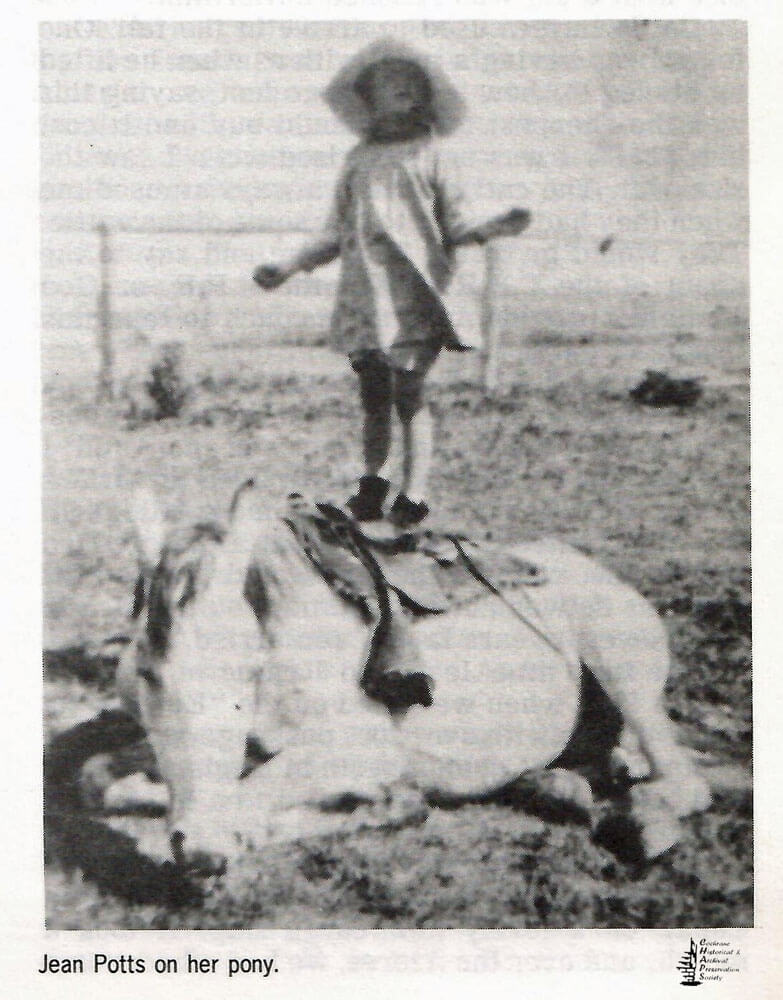
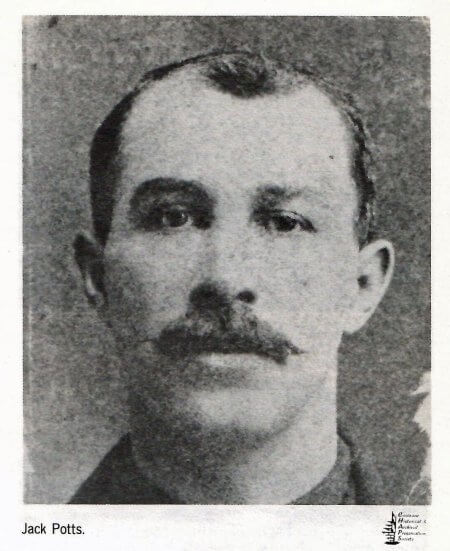

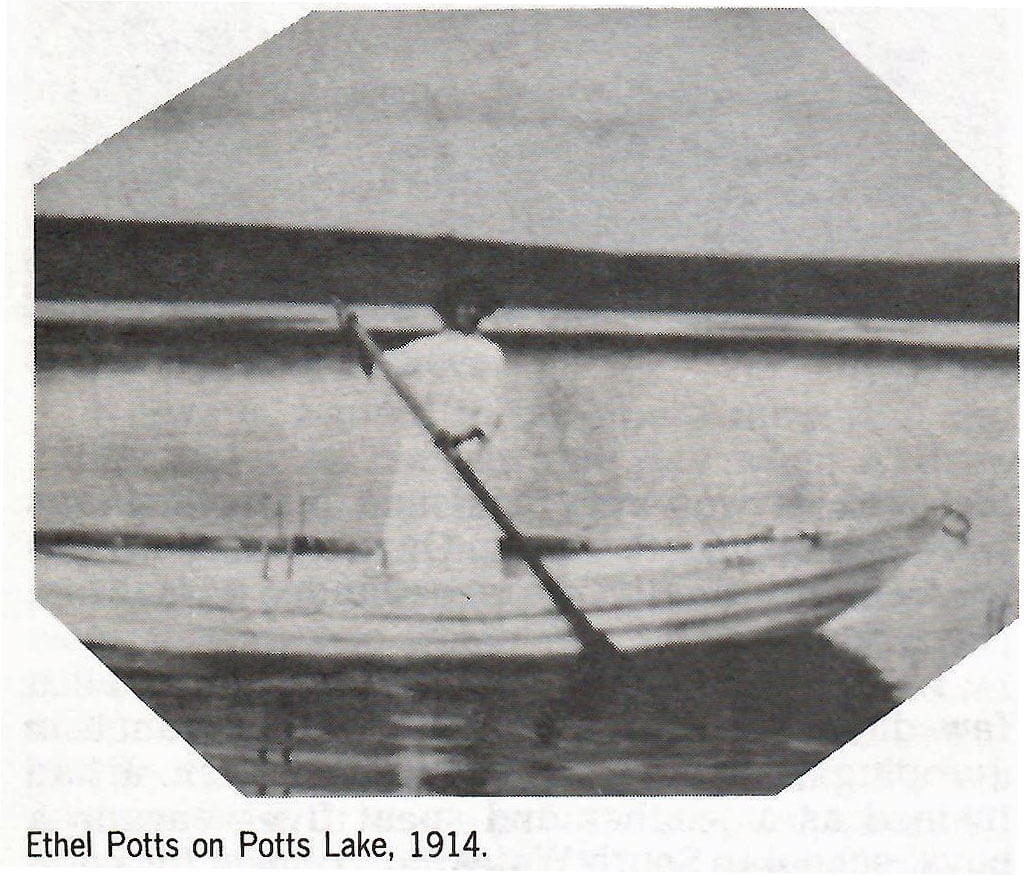
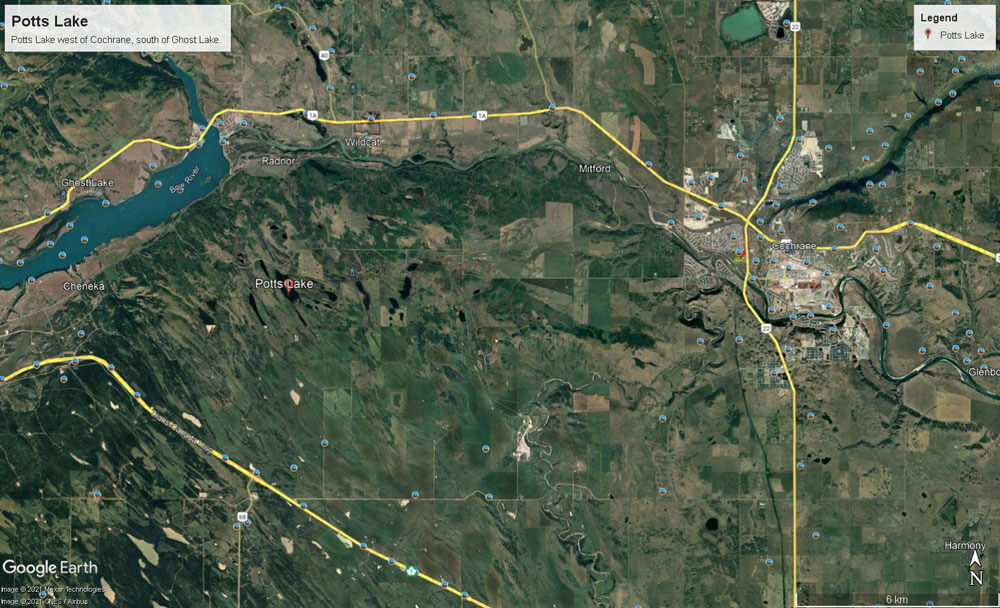
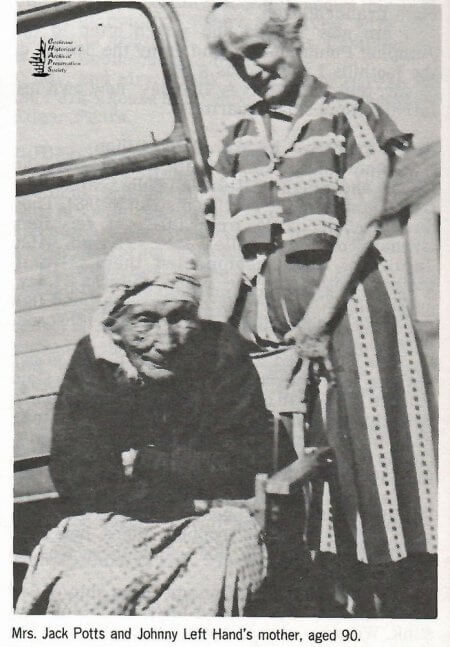
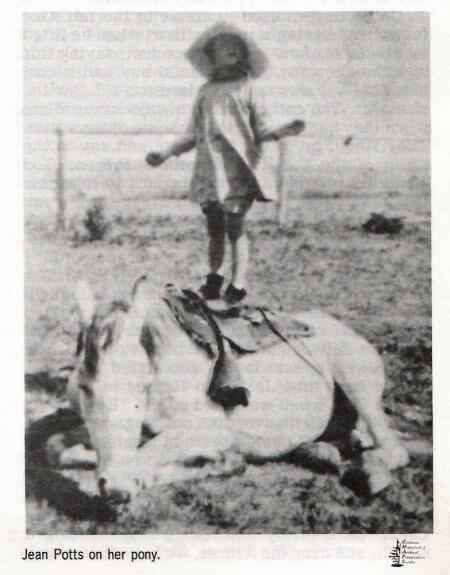
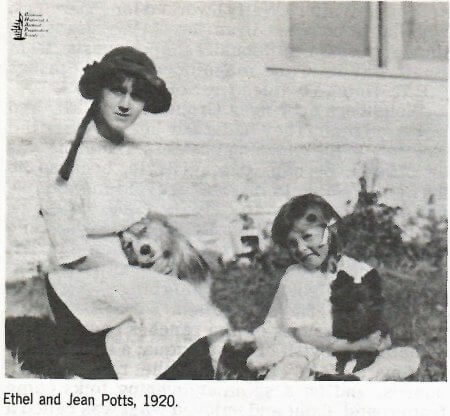

CST. Davis’ story will be re-printed soon. He was killed in another town shortly after his transfer from Cochrane.